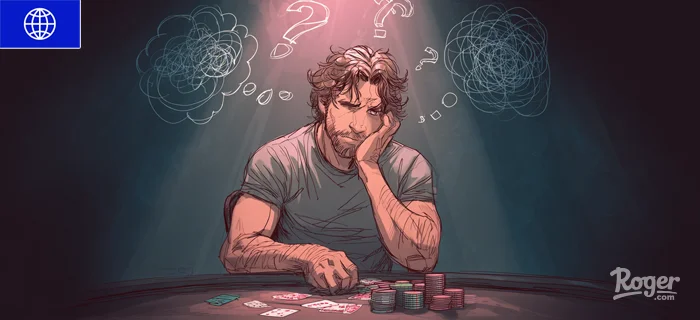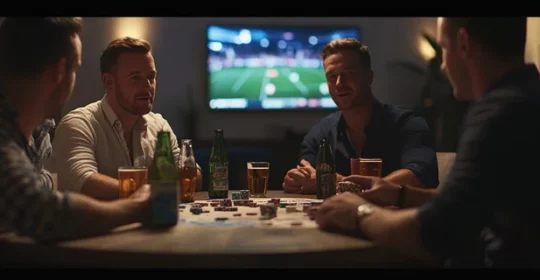Have you ever had this happen to you? You call a big bet, lose the hand, and immediately think, “I knew I should have folded.”
? Or maybe you make a hero call, win the pot, and start thinking, “What a genius play that was!”
This kind of mental trap, known as result-oriented thinking, is one of the most common (and costly) mistakes in poker. It shifts your focus from how you played a hand to what happened afterwards.
And whilst the outcome can sting (or boost your ego), it often tells you very little about the quality of your decision.
In this guide, we’ll break down what result-oriented thinking is, why it’s such a leak in your game, and how to fix it.
After reading, you’ll learn:
- Why judging decisions based on outcomes leads to poor long-term play
- How to separate mental missteps from strategic ones
- What questions to ask after tough hands
- How to review your game more objectively and improve faster
Table of contents
Two reactions to preflop betting
Picture this: You’re in a 6-max cash game with 100 big blinds. You open with AKo under the gun. The big blind 3-bets to 10 BB. You 4-bet to 25 BB, and the big blind shoves. After thinking it through, you call. Your opponent turns over KK, and you lose a huge pot.
Sound familiar? In that moment, many players would say something like: “I should have folded. There’s no way he’s bluffing there. That was a mistake.”
Now let’s rewind. Same setup, same action, but this time, your opponent shows ATs at showdown. You win. Your thought process changes: “I knew it! I had a read. That was a smart call.”
Here’s the catch: the situation didn’t change. You did.
Analysis of the decision-making process
What happened here isn’t about cards. It’s about mindset.
? Hiro made the same decision in both cases. But his opinion about whether it was a good call changed depending on the result. This is the classic trap of result-oriented thinking.
In truth, the quality of a decision in poker doesn’t depend on whether you win the hand. It depends on whether your reasoning was sound and if the move made sense given your opponent’s range, stack depth, position, and so on.
Take it from online platforms like Slotozen Casino, successful players know that good decisions often lead to losses in the short term. What matters is playing with consistency and long-term expected value in mind.
Sometimes an unexpected result can prompt us to subtly reassess our strategy. For example, when an opponent shows a hand we didn’t expect in their range. That can be a useful trigger to review our reads or consult solver calculations.
But we shouldn’t drastically change our opinion about a decision just because of the hand’s outcome.
In poker, this is called result-oriented thinking. If the decision works out, we tend to see it as excellent; if it doesn’t, we consider it terrible. Hiro’s flawed thought process is a clear example. At first glance, though, it’s not obvious where exactly the error lies.
It could be psychological, strategic, or logistical. To figure it out, we need to ask ourselves some key questions, just like we might question whether a team’s performance is truly great based on outcomes alone.
After all, the Steelers Super Bowl wins are impressive, but they don't necessarily tell the whole story of every season or decision along the way.
Questions you should ask yourself
When reviewing tough hands, try asking:
1. why did I make this decision?
This isn’t about beating yourself up. You’re looking for the technical reasoning behind your play.
Something like:
“I had at least 42% equity against his likely 5-bet range, and the pot odds were good enough to call.”
That’s a solid answer. But if your response sounds more like:
“It felt right,” or “I wasn’t sure, but I went with my gut,” then that’s a sign there may be a strategic gap or even a logistical issue, like being tired, multi-tabling, or missing some info.
Being clear on your reasoning is key to taking control of your game.
2. how should I play in this scenario—and why?
Do you know what the standard line is here? If not, that’s your next area to study.
If solvers or hand histories show that calling with AKo is profitable in this spot, then your call wasn’t a mistake—even if you lost the hand. And if you deviated from the standard for a good reason.
Say, you noticed this player 5-bets lighter than usual you’ll want to ask yourself:
3. can I justify my deviation with logic?
If you make a call outside the standard strategy, ask:
Do I have a real read? Am I basing this on HUD stats, population data, or a clear pattern from this opponent?
If not, it might be a mental leak, not a bold strategic move.
? Remember, poker is not about guessing right once. It’s about making informed, repeatable decisions that win over time.
Mental and strategic problems
Many players mix up strategic mistakes with mental ones. But getting this wrong can hold back your development.
Let’s return to Hiro’s example.
He tells himself, “That was such a bad call—I’m terrible.” But if the standard strategy supports calling AKo against a typical 5-bet shove, then his decision wasn’t wrong—it was just unlucky.
Harsh self-criticism often comes from a lack of clarity. If you don’t know what the right play was, how can you judge yourself?
That’s why separating mental and strategic errors matters so much. And here’s the irony: many mental leaks vanish once your strategy improves.
Working with a coach or even a psychologist can help, too. They won’t necessarily know the strategy, but they can help you spot recurring thought patterns that trip you up.
For example, if you always struggle to fold strong hands like AKo in high-pressure spots, that might be a mental hurdle, especially if the math says folding is right.
The bottom line? Even your mental game is easier to fix once you understand the strategic context.
Conclusion
The next time you walk away from a hand feeling frustrated, start with this:
- Identify the true nature of the issue
Is it strategic (you didn’t know the best line)?
Mental (you tilted or guessed)?
Or logistical (you missed something in the moment)? - Make a plan
Figure out how you’ll handle the situation next time—whether that means studying the spot, taking breaks, or reducing your table count. - Connect your strategy to your mindset
Don’t treat them like separate issues. Many confidence problems come from gaps in knowledge, and the reverse is true too.
Finally, remember: Poker is a game of expected value, not certainty.
It’s okay to make a good decision and still lose the pot. That doesn’t make it a bad play. Learn to measure success by how well you played. Not just whether you won.
Get started today with the best online slots.
Never miss the hottest casino content. Check out other Roger blogs here.





